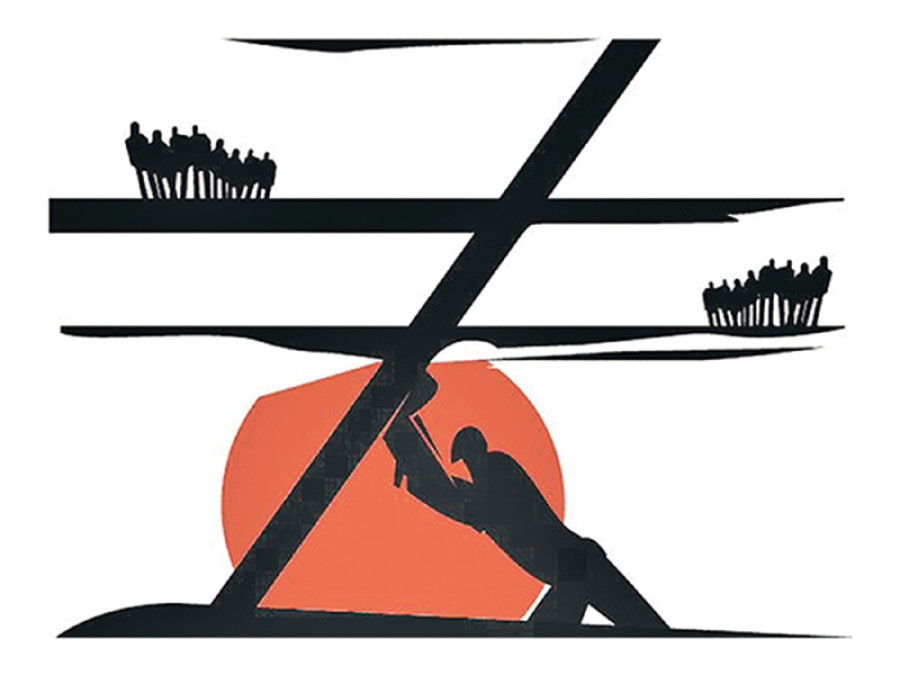Opinion
Separate ways
The Anthropological Association of Nepal (AAN) was formed at the Nepal Anthropology Conference 2016 held recently in Lalitpur. During the conference, in which 125 anthropologists participated, 51 papers were presented by professors, scholars and other researchers.
Man Bahadur Khattri & Rajendra Raj Timilsina
The Anthropological Association of Nepal (AAN) was formed at the Nepal Anthropology Conference 2016 held recently in Lalitpur. During the conference, in which 125 anthropologists participated, 51 papers were presented by professors, scholars and other researchers. Foreign researchers also presented papers and delivered keynote speeches. The formation of AAN was the result of efforts spanning over two years. Previously, anthropologists had intended to form separate departments of anthropology and sociology at Tribhuvan University (TU) during the boom period of the social sciences. However, a combined Sociology and Anthropology Department has existed at TU since 1981.
The joint department survived for three and a half decades. Common subjects were taught in the first year, and specialised curriculums for sociology and anthropology were taught separately for decades. TU separated them into independent departments last year, and a separate pedagogy has been offered from the bachelor to the PhD levels. A joint professional organisation, the Sociological/Anthropological Society of Nepal (SASON), has been inert since 2013 for failure to conduct any activities.
An identity crisis
The days ahead seem to be more challenging for Nepali anthropologists compared to sociologists for two reasons. First, anthropologists face an identity crisis because most stakeholders regard them as sociologists. The Public Service Commission and the government of Nepal have a designated sociologist post. Donors and development actors generally understand that both are the same in Nepal; however, they have to be updated regarding the splitting of the two disciplines and their specialisations. Second, anthropologists have an institutional crisis. Anthropology has been taught mainly at TU. Common people only know about sociology, and only a few know about the distinctiveness of anthropology. Speaking at the conference, TU professors said that the TU leadership and college administrations across the constituent colleges do not easily recognise both subjects.
Professor Dilli Ram Dahal became the senior-most anthropologist in Nepal after the mysterious disappearance of Dor Bahadur Bista who is celebrated as the father of Nepali anthropology. Dahal claimed that anthropology had a history of more than 200 years as an independent discipline in Nepal. He further illustrated anthropological contributions, claiming that more than 95 percent of the writings on culture and society were published by anthropologists. Since 1981, there has been a misunderstanding that anthropology is a part of sociology in several corners of Nepali scholarship. In his keynote speech, Prof Dahal said that the current identity crisis of anthropology was unnatural and a challenge to overcome.
What is anthropology?
Anthropology is a distinct and holistic science. It is a comprehensive analysis of social and cultural phenomena in past and present human history. Anthropology does qualitative research by applying prolonged engagement in the field. It adopts participant observation by engaging with the local people and using a local perspective to collect vital and reliable information that can facilitate the formation of a concrete policy and identification of actions to be undertaken.
Anthropologists adopt an interpretative paradigm while sociologists use a positivist and quantitative approach. One of the most important approaches followed by anthropologists when conducting research is cultural relativism, which means the culture of other people is not compared with one’s own, but understood from the perspective of the culture in which research is being undertaken. From this perspective, basic and applied research is carried out by anthropologists on diverse subjects such as climate change, natural resource management, feasibility and impact studies of development projects, inclusion, disaster and so forth. They regularly hold seminars and conferences and publish their findings to share their work experience and enhance theoretical and methodological knowledge. Moreover, anthropology is not confined to a structuralist idea.
An attractive discipline
In addition to the various roles anthropologists have played in social science research, they have been involved in development activities as facilitators using a people-centred and sustainable development approach. Because of their sincerity and pro-people perspective, anthropologists are popular in the media, INGOs/NGOs and government projects. We believe that anthropology can contribute much to the development of a country like Nepal. Currently, the attraction for anthropology has decreased among students. In order to attract a good number of quality students, TU needs to follow some important policy measures. If TU does not think seriously about this and work to improve the situation, it will lose a vast number of students.
In this regard, all social science professionals should agree on establishing a school of social sciences where professionals from different disciplines work to promote their own discipline. We need to have major and minor subjects, and students should be required to choose at least some interdisciplinary courses as a minor. TU’s academic and administrative authorities should cooperate in this work. The existing anthropologists should focus on research and publication of articles in peer reviewed journals by winning national and international research funding. Such research funding can be generated through the collaboration of different anthropology departments around the world. The AAN has a crucial role to play in facilitating protection, promotion and activism for further development of anthropology in Nepal.
- Khattri is a lecturer in anthropology at Dhawalagiri Multiple Campus; Timilsina is a PhD student at Kathmandu University




 9.7°C Kathmandu
9.7°C Kathmandu










